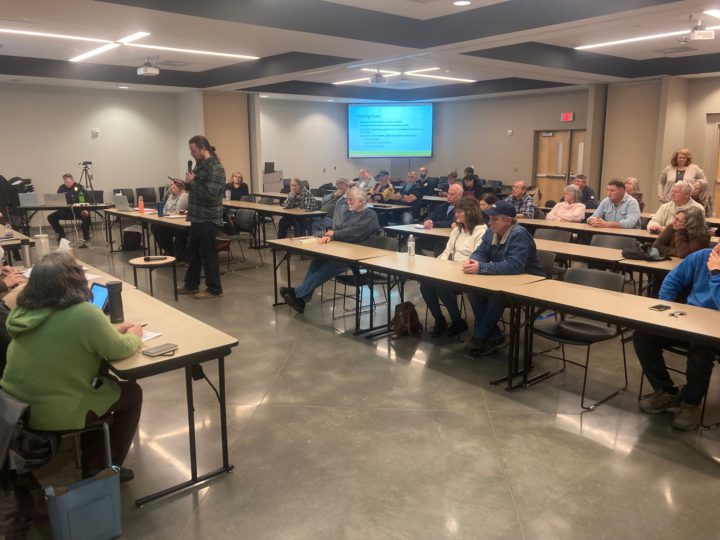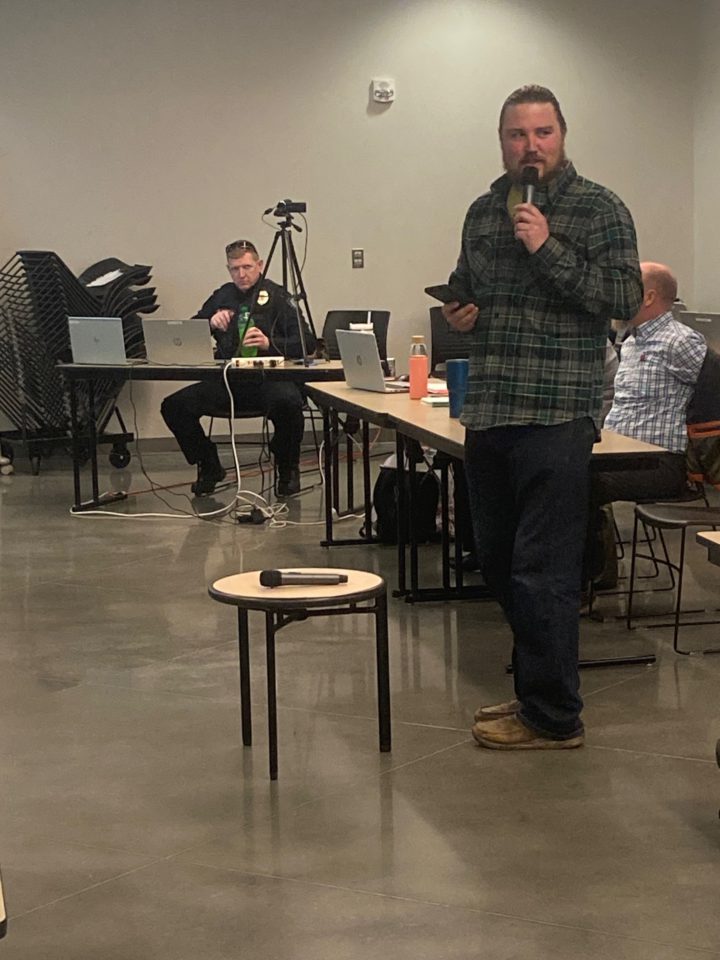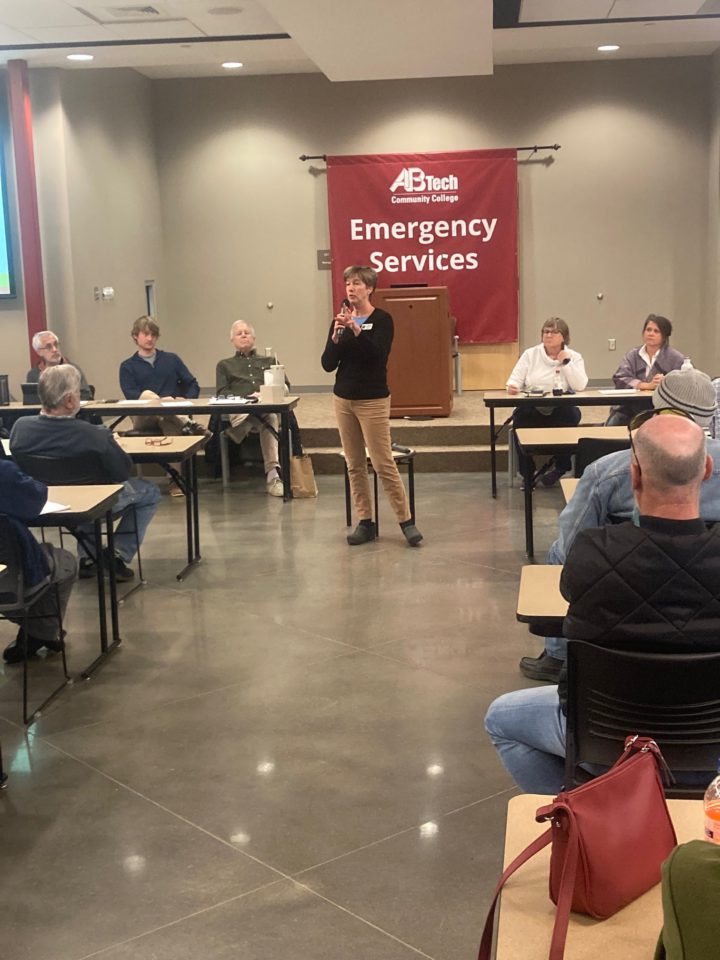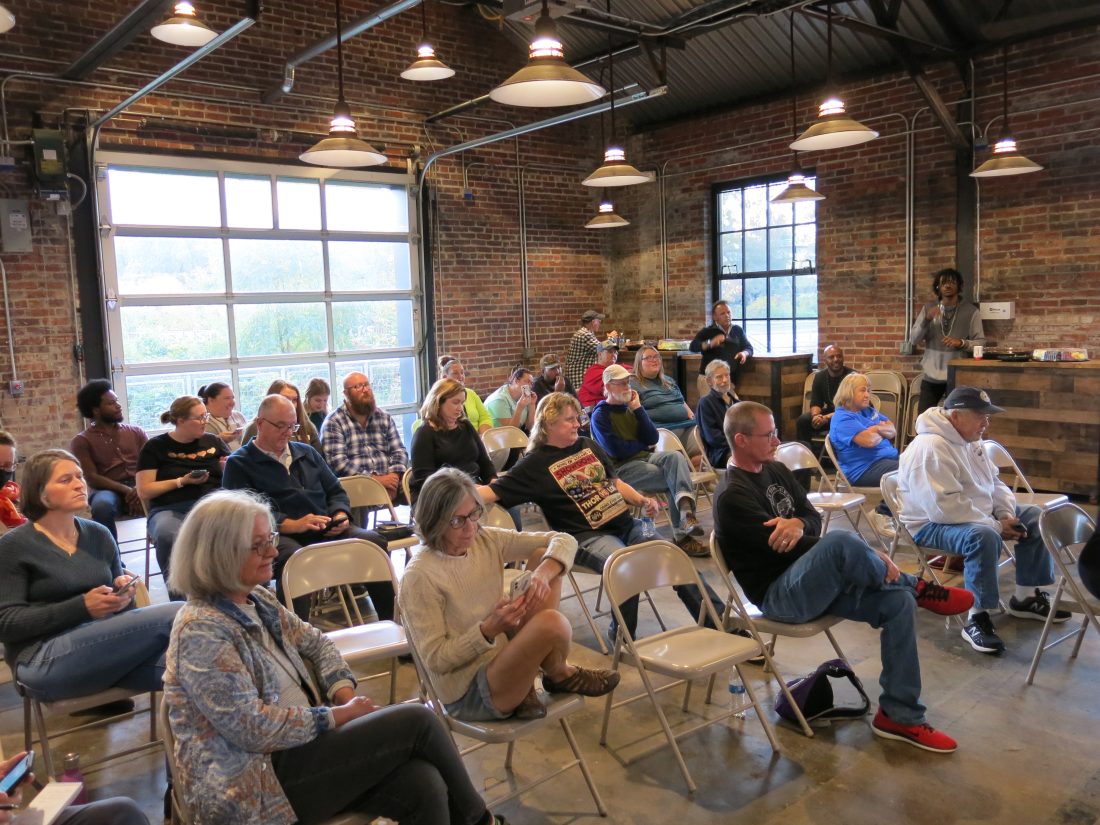Seventeen years after Woodfin annexed hundreds of parcels west of the French Broad River, some residents don’t want to be a part of the town. Many of them never did.
More than 30 residents who live on the west side of Woodfin showed up to send a message to Town Council on Feb. 1: “Let us go.”
“We’re not asking for any money. We’re just asking you to let us walk off into the sunset,” said Chip Parton, who circulated a petition to residents west of the river and helped organize the meeting with town leaders at the Buncombe County Training Center.
Woodfin Mayor Jim McAllister and five of the town’s six Council members heard resident after resident express almost two decades worth of pent-up frustrations with the town.
“It’s been 17 years, and I haven’t seen anything happening on that side of the river,” said resident Keith Freeman. “I paid right around $3,000 in taxes to the Town of Woodfin to get my trash picked up. That seems a little outrageous to me. If we got the services they get on the other side of the river, we’d be great. We probably wouldn’t be sitting here right now. But we don’t get those. And after 17 years, where is all that money that everybody in here has been paying in taxes? It’s not gone to the west side,” he said.
Parton has collected signatures of residents representing about 290 properties who want to leave the town. That’s about 55% of the area’s property owners, he estimates.

The neighborhoods of Rock Springs and Crest Mountain — part of the 2006 impetus for annexation of the western area of town — and Olivette Farms, a wealthier area in the northwest section of town that was annexed separately several years later, are not included in Parton’s petition area because there’s no interest in de-annexation there, he said.
Parton said more people would have shown up to the meeting, but many reported that they didn’t receive a letter from the town announcing the meeting. Others said they got it within a couple days of the meeting day and couldn’t make arrangements to attend on short notice. Parton noted that his letter was postmarked Jan. 24, a week before the meeting.
Town Manager Shannon Tuch told Xpress that the town mailed about 450 letters to the area that was annexed in 2006, excluding the gated Crest Mountain community, which requested to be excluded. Before the meeting, she said she didn’t know why letters may not have reached some residents, as they were sent out to all property owners.
“Nothing drives home feeling ignored like letters not reaching residents about a community meeting set up to address that very thing,” Parton said after the meeting.
How it started
The de-annexation movement sparked last summer, when the Town of Woodfin sent letters to all residents announcing a new stormwater fee that was part of a plan to keep the town’s state permit. Previous town administrators had ignored a violation issued in 2019 by the N.C. Department of Environmental Quality over the town’s negligence in maintaining its stormwater system. In response to that violation, the town levied fees to property owners based on the amount of impervious surface on a property to help pay for upgrades to the system.

But residents on the west side complained that there were no stormwater drains or infrastructure to speak of in their neighborhood, and they didn’t understand why they were suddenly asked to fork over more money to the town.
“If you listen to these people, we were left alone. And we’ve done our own thing. We were minding our business and we obeyed the law. For whatever reason … Woodfin took us in. And for 17 years we’ve pretty much ignored everything except [this stormwater fee]. And then that’s when you got the hornet’s nest stirred up,” said Max Parton Jr. “These people just want out.”
Most of the west side has no water or sewer service, instead utilizing private wells and septic systems, typical of a rural area. Without typical municipal infrastructure, several residents said they don’t understand why they should pay taxes to the town, which doesn’t operate any water or sewer lines. The Woodfin Water District, an independent entity and special taxing district whose lines don’t mirror town lines, manages water service for some Woodfin residents.
Metropolitan Sewerage District, another independent entity, handles sewer lines for parts of Woodfin and Asheville.
The town has its own Police Department, provides trash and recycling service, maintains stormwater infrastructure, maintains town streets and parks and has a Planning and Zoning Department.
Confusion over what services the town provides were prevalent throughout the meeting’s comments.
There’s also frustrations over road maintenance, including inadequate signage and poor salting in the winter on some roads west of the river, according to at least one resident. Many of the major roads in that area, however, are state roads and not maintained by the town.
Woodfin’s jurisdiction
Residents also had complaints over confusion and misinformation from previous town administrators over rules related to certain zoning regulations, requirements regarding livestock and permissions regarding manufactured homes on private property.
Woodfin does have control over town ordinances and some zoning regulations, Tuch said, adding that changes can be made to address those concerns.
Additionally, the town applied for federal grants to run water lines across the river but was denied funding, Tuch said. She said the town could look into other options for getting water and sewer west of the river.
“I feel very confident that we could land somewhere that you all would appreciate, that would be better than what you’ve experienced,” she said.
Many of the stories recounted by various residents had to do with previous town administrations, including one regarding repeated mixed messaging around how much land was required in order to keep goats. All Woodfin town council members are in their first term in office, McAllister was elected Mayor in 2023, and Tuch was hired in March 2022.
“Just because you were told ‘no’ in the past, ‘we can’t afford it’ in the past, or ‘we don’t want to do it’ in the past, none of that matters anymore. Give our town staff a second chance,” McAllister said. “Those people don’t work for your tax dollars anymore. So give us a chance.”
Amid the conversation, resident Mike Cogdill acknowledged that a listening session such as this one would never have happened under the town’s old leadership.

‘We just want out’
Still, the residents in the room kept coming back to their preferred solution, de-annexation.
At one point, state Sen. Julie Mayfield asked the room a hypothetical question. If the town came to you with solutions to all the infrastructure issues that had been discussed and fixed all these problems would you want to stay in the town and work with them or go?
It was a resounding, unanimous response. “We just want out,” they said.
“We hear you loud and clear. Clearer than we’ve ever heard you before,” McAllister said.
In order for part of a municipality to de-annex, it must come from the N.C. General Assembly, Mayfield said. In order for Mayfield or state Rep. Caleb Rudow, who was also at the meeting, to sponsor a de-annexation effort, cooperation from the town is vital, Mayfield said.
Mayfield also cautioned that there may be some unintended consequences of leaving the town that should be considered, including what type of zoning the county would apply to the de-annexed areas.
For the town itself, Tuch told Xpress before the meeting that de-annexation could have a significant impact on town coffers.
“The whole annexation area from 2006 represents approximately $245,000 in property tax revenue, or about 6.5% of the town’s total operating budget.”
The town’s budget is about $7.5 million this fiscal year, she added.
“Loss of revenue is not our main concern, though. We think there’s value in having an engaged community that works together to make things better for everyone. Giving certain residents the choice of opting out has the potential to erode the integrity of the community, lowering the cohesiveness and quality of life for everyone else.”
Mayfield said the soonest the N.C. General Assembly could consider the issue is in April, when it returns to session. She hoped the town and residents could come to an agreement on increased services or de-annexation of some of its neighborhoods before the conversation moves to Raleigh, if it gets there.
McAllister said the Council will discuss the topic at its upcoming retreat Wednesday, Feb. 7.
“I can only guarantee you one thing here tonight. It’s close to the very beginning of a lot of discussions. That won’t be the end. I can guarantee you that,” he said.




